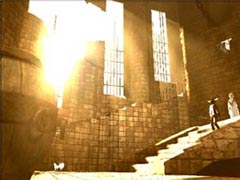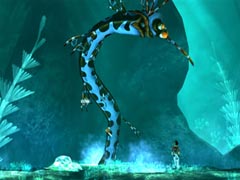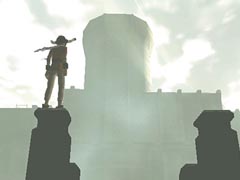Why does the growth of this already colossal industry equate to the near complete suppression of creativity and originality within the games released these days, and what can be done to change this?
Allow me to just get something out of the way before I start my practically sober rant. You’re reading an editorial. Basically, an editorial allows someone to voice their opinion on whatever subject, and then offer insight, conclusions, and often solutions to whatever topic they brought up. I’m just warning you that this is probably going to be a very anti climactic editorial, as I have no plausible solution for the personal irk I’m about to lewdly discuss. So if you spend forty-five minutes waiting for the rest of the text to load, only to realize that it already did, don’t come crying to me, unless you’re desperate and seeking love.
Thanks in part to two men by the name of Steve Ross and Nolan Bushnell, 1977 saw the birth of a little console known as the Atari VCS/2600. Atari struck a couple of huge deals with Paramount, which saw the exclusive release of two games using blockbuster movie titles, ET and Raiders of the Lost Ark. Fast forward ahead to late 2001, Nintendo released their 4th major console, dubbed the GameCube, which launched with a graphically superb game by the name of Star Wars Rogue Squadron 2: Rogue Leader, also an exclusive. Whether you purchased an Atari 2600 the day it was released back in the day, or just picked up your very first Nintendo system last week, one facet within this industry has never changed, and will likely remain unchanged forever. Licenses, franchises, and marketability.
The aforementioned basic terminology has been consistently applied to multiple industries, specifically the movie industry. The top two highest grossing movies of 2002 share these characteristics. Star Wars Episode 2, which earned hundreds upon millions of dollars, is a prequel to one of the largest movie franchises ever created, while Spiderman, which held even more success than Star Wars, used the popular Marvel license. While the videogame and movie industries have not identically mirrored each other when it deals with comparative timelines and progression, almost all of the most popular videogames created have followed a similar guideline for success.
Nintendo’s trio of huge games at this year’s E3, Super Mario Sunshine, The Legend of Zelda, and Metroid Prime, are all indirect sequels to cornerstone franchises the company created. The best selling videogame of the past year, Grand Theft Auto 3, is also a sequel to a now incredibly popular franchise. While many Lucas Arts properties such as Star Wars and Indiana Jones are still licensed out to developers, it now seems that nearly every movie, regardless of popularity, receives at least one videogame using the license. Minority Report, The Sum of All Fears, Spiderman, Men in Black 2, Reign of Fire, Lilo & Stitch, Scooby-Doo, Ice Age, The Scorpion King, and Blade 2, all released within the past few months, are just some of the movie licenses that have recently been applied to videogames. Though many great videogames released within the past decade have used movie licenses, ranging from classics like Star Wars: Rebel Assault and Indiana Jones and the Fate of Atlantis, to more recent titles like Goldeneye and Spiderman, there will always remain one simple, disheartening basis when it comes to videogames using a license or franchise name as a crutch.
Every time a developer or publisher opts to purchase a license of a movie, television show, novel, or even a person, be it Tony Hawk or John Madden, the odds that the project will thrive on creativity, originality, or innovation decrease drastically. Remember ET, one of the two major games featuring big time licenses Atari snagged back in the 2600 era? It sold over a million copies, and was honestly one of the biggest pieces of shit ever to smear itself inside a cart. For every Goldeneye, there are 10 Scorpion Kings. For every Spiderman, there are a dozen Superman 64’s, for every Mario franchise, there are 10 Tomb Raider’s, Jet Moto’s, and Twisted Metal’s. When a development house is given a license to use for their creation, the pressure to create something great and fresh subsides. When a publisher notes that they’ll be marketing a sequel to a long lasting and popular series, their want for a great videogame often evaporates. You could not pay me nearly enough money to even count the number of catastrophically soulless carts that inhabit the GBA's current library. And while I have plenty of hate and disgust towards this trend, I’ve decided to move past all of the negativity this mindset causes, and look at the two beacons of light.


Both ICO (left), which was released last year for the PS2, and Project BG&E (right), which will be released for all systems within the near future, are two games that dwell inside a very small and very special category. They are not using any licenses. They are not sequels, nor even spin-offs of a franchise. They are even not easily marketable by today’s practical standards. ICO and BG&E are two videogames that breathe originality, artistic integrity, and imagination, while purposefully not conforming to the industry’s ritualistic mold, purely for the sake of staying original creations. So why do I mention these two titles? The sole fact that I want them to be appreciated, if not only for the bold stance that their creators, and publishers have taken.
ICO was released late in September of last year, and sold a mere 70,000 copies, despite garnering bewildered praise from dozens of PS2 related magazines and websites. I realize that the majority of you reading this most likely don’t own a PS2, but I urge that you play the game, or at least read a review for it, and understand why the game is so fantastic, if the screenshots haven’t already convinced you. Rumor has it that the development team is working on what looks to be a sequel set in the same universe as the original, and while that is great news, it does bring up some conflicting emotions, once you realize the apparent franchising aspect that hasn’t exactly been embraced in this article.
Project BG&E, while looking to be a vastly different game from ICO, looks to possess the same traits that the made the PS2 classic so wonderful. Set in a fictional world, the game has you exploring land, ocean, and space, in order to photograph fantastical creatures from all over the universe. The game is being worked on by Rayman creator Michel Ancel, and while little is known regarding the title, the dynamic and unique visual style, integrated into the numerous game engines (which will feature not only on foot action, but also flying through both air and space and zipping across ocean floors). This is not to say that the title is going to be a guaranteed top tier masterpiece, in fact it may not even be good. But right now, from where I’m looking, both Ubi Soft and Michel Ancel’s development team are taking a fairly big risk (financially) to create something.


The use of licenses and the revisiting of franchises will not hurt the industry, and it does not necessarily stifle creativity. As technology evolves, many developers have chosen to create new games, new experiences, while using existing labels. I can list dozens of titles released last year that used a license or franchise name, yet were original and compelling experiences. Unfortunately, the current industry has grown so large, that millions of dollars must be spent developing and marketing the average console videogame, which leads to the natural mindset of creating a product that will hopefully appeal to the masses. What can realistically be done to change all this? Nothing.
Every time I insert Jet Set Radio into my Dreamcast, every time I watch the sun filter through the luscious leaves in ICO, and every time I stumble upon a new screenshot or fragment of information regarding Project BG&E, the more I realize how scarce these titles have become, and how there’s nothing I can do to change that. So instead of trying to concoct a wealth of inane solutions for a problem that can’t be fixed if it isn’t viewed as a problem by the industry, I decided that the only thing I could do about the situation is write this editorial. So I did.
If you have an opinion regarding this subject, feel free to email me or leave comments in our Talkback area.